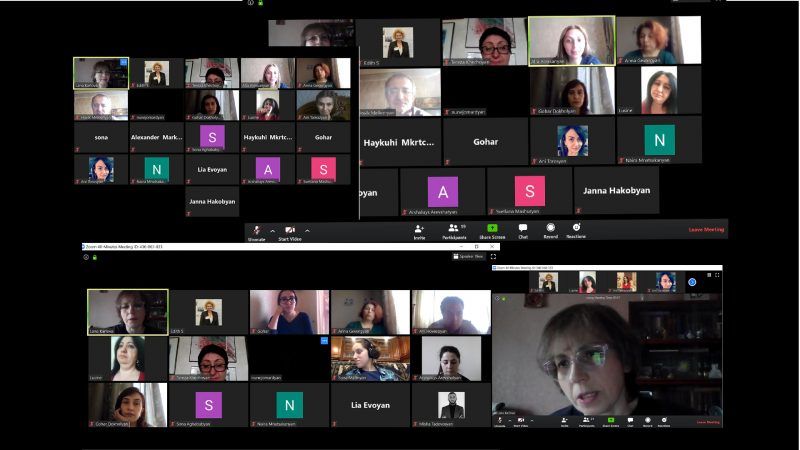“Online Courses & Coordination of Erasmus+ ICM in COVID-19 Situation” 1st Online Working Meeting with IRO Network
In response to the challenges of the COVID-19 in higher education, on April 7th 2020, National Erasmus+ Office in Armenia (NEO-Armenia) organized the first online meeting with the staff of International Relations Offices (IROs) which coordinate Erasmus+ International Credit Mobility projects at Armenian universities. The meeting took place via ZOOM platform, bringing together more than 25 participants from 11 capital and 2 regional universities, as well as several members of the national team of Erasmus+ Higher Education Reform Experts (HEREs).
The universities presented the main challenges they face in the sudden transition to online learning: a) the lack of digital skills and technological capabilities of the teaching staff, b) the evaluation of the learning efficiency and the quality of the online courses, c) the analysis and identification of possible gaps in the European Credit Transfer and Accumulation System (ECTS), d) IT services used to support the online teaching/learning platforms and to enforce their security, etc.
The discussions centered on the results of several surveys conducted among students of different HEIs with an aim to assess the accessibility of online courses. Regional students’ access to online education was particularly highlighted, as not every student has a personal computer and, thus, is able to participate in the offered courses. In this respect, the good practice of Vanadzor State University was presented associated with the university’s decision to temporarily provide the socially vulnerable students with notebooks according to a bilateral contract.
The participants of the online meeting also discussed the effectiveness of the digital platforms and tools (Moodle, Big Blue Button, Google Meet, Zoom, Microsoft Team, Jitsi) that are used to ensure the continuity of the educational process at the universities.
The participants of the online meeting also discussed the effectiveness of the digital platforms and tools (Moodle, Big Blue Button, Google Meet, Zoom, Microsoft Team, Jitsi) that are used to ensure the continuity of the educational process at the universities.
One of the key topics for discussions was the continuity of education of Erasmus+ Armenian students in the EU countries and that of foreign students in Armenia with the help of distance learning solutions and online educational tools, as well as their opportunities to return home and participate in Erasmus+ online mobilities. IRO representatives acknowledged that this approach might later entail many challenges in credit transfer and recognition.
IROs also emphasized the occurrence of financial losses as a result of cancellations and interruptions of Erasmus+ staff mobilities and the importance of application of relevant crisis management mechanisms.
The staff of Erasmus+ Office once again encouraged to consider and consult the force majeure provisions in the Participant Grant Agreement for students and staff as well as to widely disseminate among the projects’ beneficiaries the European Commission’s Frequently Asked Questions (FAQs) regarding COVID-2019 impact on Erasmus+ Activities.
At the end of the working meeting, NEO-Armenia recommended IROs to familiarize with the innovative and interactive teaching and learning tools developed within the framework of Erasmus+ PRINTEL Capacity Building Higher Education (CBHE) project.

